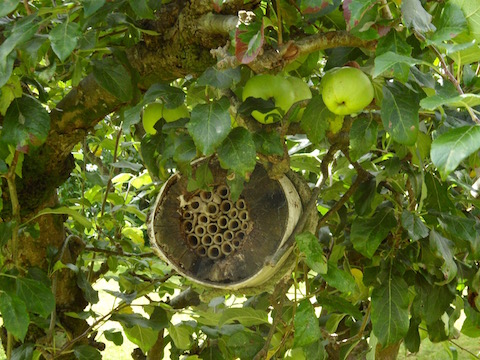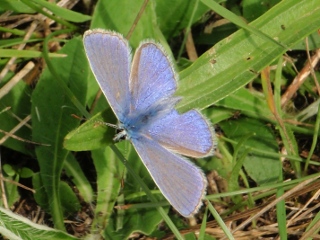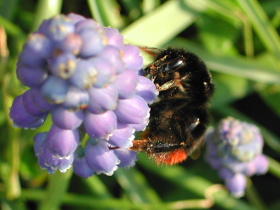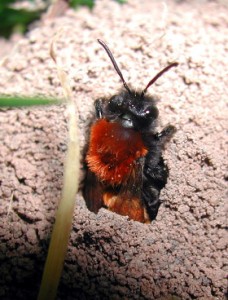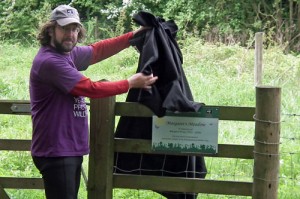Our wildlife gardening articles highlight how important it is to provide places to hibernate over winter for the many types of insects beneficial to our gardens. And many of you are no doubt using ‘insect hotels’ of one sort or another for this purpose. If you have fruit trees or bushes, especially ones that produce blossom early in the spring, then you might like to try putting small insect hotels in your trees – as shown in this picture – so that pollinators will be ready and waiting as soon as the weather warms up and the blossom buds open!
Author Archives: snotts-jr
Big Butterfly Count 2016
It’s summer so it’s time to get out into gardens, parks and countryside to look for butterflies and count them for this year’s Big Butterfly Count! These annual surveys are run by Butterfly Conservation and map the distribution of butterflies and moths in the UK to inform us about changes in the environment. Doing a count at one location only takes 15 minutes, then you can add your results online and see them appear on the map! The survey began on 15 July and runs until 7 August (counts can be submitted online up till the end of August). This year’s survey is important to indicate how butterflies have been affected by a run of cooler and wetter than average weather. See Big Butterfly Count website for more info, butterfly id chart, results map and free smartphone app…
Keep our bees buzzing!
Insect pollinators are vital for fruit crops – from apples to blackberries – commercial and in the wild – and for our garden and wild flowers to set seed. Some fifteen hundred species of insects act as pollinators in the British Isles, including various bees, wasps, hoverflies, butterflies, moths and beetles. Most have suffered serious declines in numbers since the second world war; for instance, it is estimated that at least twenty of our native bee species have become extinct during this period! These declines are likely to be linked to changes in our landscape and patterns of land use since the 1940s. In early November 2014 the Department for Environment, Food & Rural Affairs launched its National Pollinator Strategy “to protect pollinating insects which support our food production and the diversity of our environment” – planned actions to reverse the decline of the last 70 years. If you have a garden or allotment you can help:
- Simply grow more flowers! Native species are best and plants which flower early and late in the season are particularly helpful to insects emerging from or preparing for hibernation.
- Leave at least one patch of your garden to grow wild. This might look a bit scruffy to you, but it will provide habitat for your pollinating insects to breed, lay eggs and raise their young.
- Cut your lawn less often and let the grass grow longer to allow nectar-rich plants such as clover to flower and feed pollinators.
-
Avoid disturbing places where pollinating insects may be nesting or hibernating. Most apart from honey bees live in the wild and hibernate or nest in holes in trees, walls, rotting wood or by burrowing into loose soil – careless garden tidying in winter can destroy next spring’s pollinators!
- Avoid using pesticides. Check your garden regularly so you can spot problems while they can be controlled by physical methods – hoeing; removing infected plants or parts of plants. If you have to use a pesticide keep quantity used and area covered to a minimum.
See the Bees’ Needs website for more on this topic.
April
Featured
April is the month nature really wakes up after winter: bird migration is in full swing, trees and wild flowers are bursting forth, and insect numbers grow by the day. There is so much to see!
Read our guide ‘What to look out for in April’ by following this link.
GET CLOSER TO NATURE THROUGH ORGANISED EVENTS
Sun 7th April Wilwell Farm Cutting in Spring
Join Gordon the Warden to look at the first signs of spring, including the early flowers of the season. Meet 10 am at the Wilwell car park on the B680 between Ruddington and Wilford , on the left just before the ring road bridge (look out for reserve sign). Postcode for approx. location is NG2 7UT. what3words = home news fuzzy.
For more information, please contact gordon.dyne@gmail.com
Sun 21st April Bunny Wood Open Day
See the Bluebells in bloom and learn about the woodland’s history. There’s a guided walk at 11am, plus children’s activities. 10.30 am – 3.30 pm Car park is on the left of the A60 climbing up out of Bunny village towards Costock. what3words = deflect corrode helped .
For more information, please contact Christopher.terrell-nield@ntu.ac.uk or ring 0115 9374906.
Sun 21st April Bingham Linear Park
Wildlife walk looking for butterflies, birds, flowers and insects with Jenny Craig. Meet 10 am at the Tithby Bridge entrance on Tithby Road, Bingham.
For more information, please contact jenny@ifcraig.com .
Sat 27th April Dawn Chorus at Sharphill Wood
Join John Elwell to see, and hear, a range of spring birds; please bring binoculars. Meet 6 am
Please contact John Elwell on 07794 052672 for details and to reserve a place.
Sat 13th April Rushcliffe Wildlife WATCH GROUP
11:00 am – 1:00 pm. Meet at Rushcliffe Country Park Visitor Centre.
For young people between 8 and 12 years old who are interested in wildlife-related activities. Meets monthly, on every second Saturday. Charge £3 per session.
ANNUAL GENERAL MEETING
The South Notts Local Group Annual General Meeting will take place on Thursday 25th April, starting at 7.00 pm. The meeting will be on line, via Zoom, and will be followed by a free talk at 7.30 pm. Fuller details will be available shortly.
WORK PARTIES
Our local nature reserves rely on volunteers to help maintain them, and organise regular work parties. Planned parties for April are as follows:
Sat 6th Wilwell Farm Cutting
Sat 13th Wilford Claypit Meadow Park
Sat 27th Springdale Wood
Sun 28th Sharphill Wood
Details of times, etc. can be found in the Diary section of our website here, so if you have some spare time and energy please feel free to join in – you will be very welcome!
Don’t forget, you can find out more about what’s happening with nature in Rushcliffe by following us on Facebook at https://www.facebook.com/SouthNottsWildlifeGroup
If you would like to contact us, send an email to southnottswildlife@gmail.com
Margaret’s Meadow
On the morning of Saturday 10th May 2014, over twenty of Margaret Price’s friends met at Wilwell Cutting Nature Reserve to commemorate her lifelong commitment to Nottinghamshire’s wildlife and to mark the naming of Margaret’s Meadow in her honour. As Margaret was a founder-member of Nottinghamshire Wildlife Trust it seemed fitting that this commemoration also formed part of the NWT’s 50th Anniversary celebrations. Full report and pictures…
Spring newsletter available
Our latest local group newsletter, for spring 2014, is now available to read online or download as-printed. Features include: an appreciation of the life of Dennis Heffernan; a well-illustrated review of Bingham’s butterflies; this year’s spring fair; the future of our newsletter.
Skylarks planning application
Nottinghamshire Wildlife Trust have submitted a Planning Application for proposed work at Skylarks Nature Reserve, which is to integrate the newly-acquired land with the original reserve and to make habitat improvements. The planning application number is 14/00706/FUL and the plans are on Rushcliffe Borough Council’s planning website at www.document1.co.uk/blueprint/ Please take a look at them and feel free to comment if you wish – hopefully in support!
We have recieved notification that the application has been passed by the council, so another milestone for the project has been passed and the winter months should see some major engineering works at Blotts Pit as some parts of the site are re landscaped to create wet meadows, ponds and reedbeds.
Successful AGM
We held our local group Annual General Meeting and Talk in West Bridgford on Thursday 24th April. The newly-elected South Notts committee is: Gordon Dyne (Chair), Valerie Holt (Vice Chair), Jackie Glenn (Secretary), Neil Pinder (Treasurer), Margie Richards, Geoff Fyles, Neil Glenn, Judith Booth, Graham Leigh-Browne and Cally Martin. The following documents presented to the meeting are available:
Fundraiser: Larwood & Voce Pub Quiz
The Larwood & Voce ran a charity pub quiz on Sunday 13th April, raising a magnificent £570.40 to help fund the work of Nottinghamshire Wildlife Trust! Many thanks to Dan Cramp, the pub manager, and his staff for all their hard work in making this such a successful evening. More info on the Larwood & Voce…
Rushcliffe Wildlife Watch
This group organises wildlife-related activities for young people (age 8–13), meeting on the second Saturday of each month (except when this clashes with holiday weekends!) at The Environment Centre, Rushcliffe Country Park. Next meeting: 10th May, then 4th June and 12th July. Wildlife Watch is the junior branch of The Wildlife Trusts and the UK’s leading environmental action club for kids, see wildlifewatch.org.uk for more…

